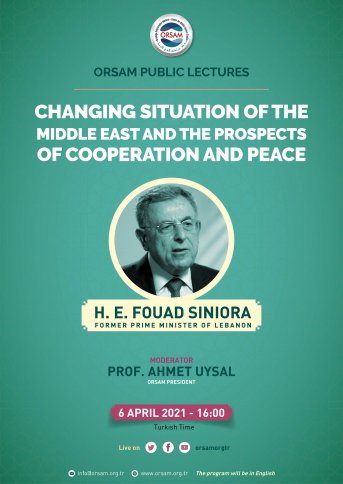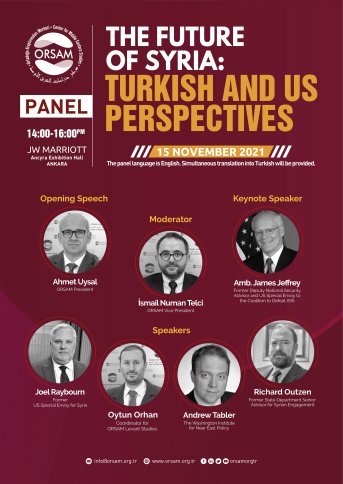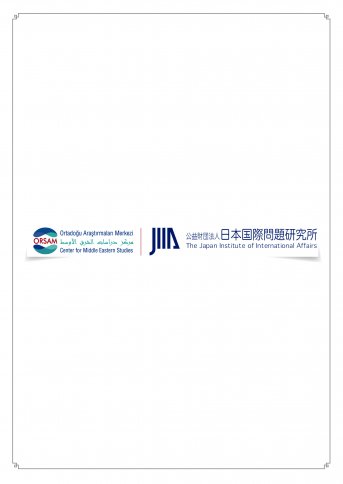
ORSAM Public Lecture: The Changing Situation of the Middle East and Prospects for Cooperation and Peace
Keynote Speaker: H.E. Fouad Siniora, Former Prime Minister of Lebanon
April 6, 2021
Transcript of Fouad Siniora’s Speech:
Dear friends, ladies and gentlemen,
Thank you for inviting me to speak at the ORSAM Center for Middle Eastern Studies on the Changing Situation of the Middle East region and the prospects of Cooperation and Peace.
Today, the world at large, that is witnessing the devastating consequences of the Covid-19 Pandemic which has caused the greatest economic, political and social damage to humankind since world war-II, is still suffering from a serious phenomenon known as the “Trust Deficit Disorder”. People feel troubled and insecure. At present, trust is at a breaking point: trust in national and International institutions, trust among states, and trust in the rule-based global order. Moreover, within countries, people are losing faith in political establishments, polarization is on the rise, and populism is on the march. International Resolutions are ignored and cooperation among countries is still more uncertain as ever. As challenges are growing outward many people are turning inward and multilateralism is under fire at a time when what the world needs the most, is a commitment to rule-based order.
Dear friends,
Ten years have passed since the outbreak of the so-called Arab Spring that transformed into a stormy wintertime in some Arab Countries; seriously undermining the stability, the economy, as well as the long term prosperity of several Arab Countries. Syria, Iraq, Yemen, Lebanon, Libya and Sudan were particularly affected. In the last decade, these countries witnessed major events and dangerous setbacks that eroded the power of the State and the Rule of Law: thus furthering the deterioration of their political, social and economic situations. In this respect, the National State in these Countries is effectively overwhelmed by paramilitary organizations and nonstate actors that are subject to outside regional and international interference.
As a matter of fact, over the past several decades, the Arab region has suffered from the continuous failure of many Arab States in tackling their socioeconomic and political problems. Poor leadership in many of these countries is to a great extent responsible for the mismanagement of the ethnic, and religious diversity of their countries. Instead of using diversity as an opportunity to enrich their countries, leaders turned it into an explosive crisis.
Moreover, some Arab states have failed miserably in managing and regulating their brotherly and friendly relations within the Arab region. This contributed to a new situation whereby non-state actors have thrived and started to play a much bigger role, feeding on, violence and conflict to propagate more violence and conflict.
These tragedies are unfolding in the midst of a growing Arab failure to play any vital role in determining the fate of the Arab region.
These troubling and serious imbalances in the region have encouraged both regional and global powers to use some Arab countries as a battle field rather than a medium of collaboration, and a war zone rather than a zone for cultural and economic cooperation. This led to giving some of the regional powers including especially Iran and Israel, a growing role in furthering the destabilization of the region either by direct aggression or by instigating internal conflicts, dissensions, and seditions in the countries of the region.
In particular, the Islamic Republic of Iran is still heavily and stubbornly engaged in undermining stability and security in the region as it pursues proxy warfare and direct interference in four Arab countries namely Iraq, Syria, Lebanon, and Yemen. Additionally, Iran is openly using these countries as captive states for the sole purpose of improving its bargaining stance with the United States in the upcoming nuclear negotiations...
On the other hand, Turkey and the Arab World are bound by mutual interests as well as common cultural and historic roots that span centuries. The Arab region expects a positive and constructive role to be played by Turkey particularly in Syria and Libya on the basis of mutual respect and noninterference in the domestic affairs of each other. We are encouraged by recent developments emanating from the recent talks between Turkey and Egypt. Hopefully, diffusion of tension and misunderstanding will favor an amicable resolution of crises in Libya, Syria and elsewhere.
Ladies and gentlemen,
The Palestinian conflict remains the oldest unresolved crisis in modern history and the most relevant in the Arab and Islamic world. The disappointing Deal of the Century advocated by the Trump administration is fading away and is in contradiction with the basic principles of International law as well as the relevant resolutions of the Security Council and the General Assembly of the UN.
The recent realignment of UAE, Bahrain and Sudan in striking the Abraham accord with Israel will not have a positive impact on the prospects of a long-term and sustainable peace in the Middle East as long as the main issues in this eight-decades problem are not resolved.
In desperation, the Palestinians have recently resorted to the International Criminal Court. As loud and clear as it can be, the Palestinians undeniably have the right of pursuing a just, viable and permanent political solution to save whatever is left of their rights and dignity after decades of suffering and resentment.
Ladies and gentlemen,
Today, several countries of the Arab region face the alarming prospect of intractable conflict. The international community seems to have forgotten the Syrian people who rightfully fought to live in dignity and who paid dearly the cost of their uprising with blood, hunger, resentment, massive physical destruction, and impoverishment. Millions of Syrians, almost half of the Syrian population, have been displaced internally or forced to flee in desperation to neighboring countries. The image of the drowned Syrian child on the beach will always be a stain on the world conscience. As Syria remains a human and security tragedy in the region it has also become a battlefield among the several regional and international players, namely Israel, Iran, Russia the US, Turkey, and among their respective clients like Daesh and Hezbollah.
Security Council Resolution 2254 reaffirmed its strong commitment to the sovereignty, independence, unity and territorial integrity of the Syrian Arab Republic and calls for an inclusive and Syrian-led political process that meets the legitimate aspirations of the Syrian people. Most importantly it mandates drafting a new constitution intended to set a political solution in motion. It is therefore hoped that this will converge with the improvement arising from the talks taking place among the trilateral group consisting of Russia, Turkey and Iran. Most noteworthy in this respect is how the increasing military presence of Russia in Syria has extended its influence in the Mediterranean and the Red sea regions. The recent heightened tensions with the US after the election of President Biden are reminiscent of the cold war.
In this respect, it is in Turkey’s interest to actively seek an arrangement in Syria that puts an end to the forced displacement of Syrians, and ultimately achieve peace and security along its southern borders.
As for Libya, it seems that the Europeans together with Turkey and Egypt are becoming increasingly interested in joining efforts, particularly as Egypt and Turkey seem intent on improving their relations. Such a multilateral understanding will surely improve the chances of putting an end to this dangerous and fruitless conflict. Real efforts are still needed to resolve the remaining problems by putting pressure on the various regional powers to accelerate the withdrawal of armed militias.
The tragedy in Yemen has continued uninterrupted since 2014, between the Yemeni government that is backed by the Arab alliance and the militias of the Houthis that have tremendous Iranian support, is considerable. Persistent Iranian intervention in Yemen is a source of serious worry of further disorder in this country and the possibilities of spillover to other countries of the region.
Nevertheless, there appears to be some good indications in view of the recent peace initiative proposed by Saudi Arabia which was well received by major powers.
As for the recent Chinese-Iranian Strategic Agreement, and though it is still not clear what it may lead to, it is worth addressing the issue of the US shifting its attention to its domestic issues in trying to foster its internal national unity, and to mend its relations with western Europe and to concentrate on its great power rivalry with Russia and China. The Middle East seems to have lost its strategic significance for the US. While Russia has emerged as a strong regional player particularly with its significant military presence in Syria. China over the past two decades has become the economic powerhouse of the region, becoming the number one economic partner of the GCC and Lebanon for that matter. The recent China Iran Strategic Agreement may impart some political leverage to China's economic dominance.
Though the past experience of the Chinese economic relations with some of the developing countries in Asia and Africa was not that successful and did not help in materializing the expected benefits to these countries, I tend to think that China as it is cultivating good working relations with all parties concerned in the region including Israel, Iran, and Russia it may play a mediational role and may be well positioned to help with reconstructive efforts.
Dear friends,
Encouraged by some good signs regarding the recent reconciliation among the Gulf Counties, and the relative containment of the radical Islamic Movements, I believe that the fragile and weakened nations of the Middle East should do their best to stay clear of the great power politics of the great power rivalry. In fact, the uncertainty of the superpower confrontation should encourage the local players of the region to minimize the regional tensions through active diplomacy and frank discussion of internal and regional security issues, and to cultivate their long term common economic interests.
Ladies and gentlemen,
These conflicts are a clear and present danger to peace in the region and beyond. Previous experiences teach us that wars don’t always happen when both sides of the conflict want to go to war. Sometimes, war forces itself on both sides of the conflict due to certain uncontrollable mistakes or unforeseen events. This is exactly why it is so difficult or almost impossible to predict the advent of war in this part of the world or when will peace prevail.
But let us not forget that the status-quo will never be a sustainable solution in a region that faced decades of injustice and underdevelopment. Moreover, it is becoming clear that there is no military solution to the mounting problems of the region Peace and stability will prevail when real, sincere, and serious efforts are made towards achieving fair and just solutions that take into consideration the common interest of these countries, and their people.
I know that the younger generations in the Arab world are tired of tensions, fear and wars. They demand real and effective solutions to the mounting problems they are suffering from, so that they may live in peace and dignity under the rule of law.
Ladies and gentlemen,
Economic factors have always been a reason for waging wars, but also for building peace with neighbors based on common interests. It is estimated that by 2030, the population of the Arab World will probably reach 600 million, the majority of whom are young and eager to develop their countries that are rich in natural resources as well as in human capital.
Let me emphasize the fact that the tensions between countries and within countries have always been contagious particularly as our globalized world is becoming deeply interconnected. Encouraging instability and confrontation will ultimately fuel migration which in turn will create cultural shock and eventually feed the ultra-right movements and fuel ultra-nationalism. A vicious circle of escalating extremism, xenophobia as well as chauvinistic and racist attitudes will inevitably produce more extremism, violence and terrorism.
Dear friends,
In my opinion, the only way to establish strategic and sustainable security and stability in the Middle East is through strengthening the forces and elements of Peace. This is only possible by marching ahead with great resolve towards reinforcing justice and full respect of the International Resolutions. It is imperative that adopting inclusive policies in these countries will promote peace, stability, and support growth and progress.
In this respect, I tend to believe that Turkey can play a very important and constructive role in contributing towards the prevalence of peace and stability in several countries of the region particularly in Syria and Libya. Achieving this strategic and sustainable stability in the region can be attained by enhancing efforts towards greater cooperation and productive economic relations: ultimately leading to building a better and peaceful environment among the countries of the Middle East.
Along these lines, I suggest that serious efforts should be directed along the following three courses of action:
1. Endorsing a two-state solution for the Palestinian Conflict will respond to the needs of the Palestinians to have a sovereign and Viable State and the needs of the Israelis for Peace and Security. Unless an effective plan guarantees the creation of a sovereign Palestinian state is reached, the empty promises given to Palestinians would result in a false hope that would only aggravate their frustration. It has become quite clear that Israel can’t continue its expansionist policy, build more settlements, or evict Palestinians out of their homeland and seek a peaceful resolution. Nor can it continue to ignore implementing the related Security Council resolution #242, and the Arab peace initiative of 2002 (in BEIRUT) calling for a two-state solution. We should realize that the Palestinians are unable to handle more empty promises or false peace compromises.
2. I believe that the Arab world has to make its position clear and firm in terms of standing up to Iran’s interventionist policy in Iraq, Syria, Lebanon and Yemen, as well as, to the continuing threats of its proxies in the region like Hezbollah in Lebanon, the Houthis in Yemen, and the Hashd-Al-Shaabi of Iraq.
Iran will soon be busy with its parliamentary and presidential elections, while it is simultaneously betting on its regional interventions and pressures on the four countries of the region to improve its bargaining position in the forthcoming negotiations with the US, hoping that the US will blink first and come back to the Joint Comprehensive Plan of Action (JCPOA) Agreement. On the other side, the US seems to be waiting for the upcoming elections in Iran.
At the present, Iran is paying a heavy price in financial, economic, and political terms. Ultimately, Iran will need to address its mounting problems.
In this regard, I believe that sooner or later, the politics of fatigue are going to set in the region. The various countries and particularly Iran, cannot continue diverting resources away from its productive economic sectors and away from the pressing and growing and highly explosive needs of the Iranian people. The same applies to the people of the Arab region.
As the Arabs should clearly be standing up to the threats of Iran, and its intervention in the region, the Arab world should simultaneously and sincerely extend a hand towards Iran in response to every genuine positive gesture and friendly position expressed by Iran.
In this respect, I would like to draw your attention to the fact that there are plenty of common interests and benefits that need to be addressed between the Arab world and Iran. Growth and prosperity for both the Arab World and Iran are not mutually exclusive
3. The empowerment of Arab moderates and secular forces in the region, which in return would call on the religious authorities to work on creating inclusive conscious societies that believe in diversity, respect for others, and peace. The diversity in the Arab countries could enhance a new moderate secular system based on the respect and protection of freedoms and religions. It has to be clearly stated, ladies and gentlemen, that we need an approach that highlights the values of hard work, discipline, productivity, and also encourages critical thinking. We need a new religious discourse that rises up to the level of our fast changing world, a discourse that is adapting instead of regressing, and that opens the door to our new generations to be at peace with others. through correcting the Misconceptions about Islam that have been maliciously and systematically disseminated in the minds of our youth. An enlightened approach is urgently needed to address politically driven radicalization at home and xenophobia abroad. In brief, we don’t want to scare the world, but we also don’t want to be scared of it.
The same way destruction and evil are contagious, reform programs and construction should also be contagious.
Ladies and Gentlemen,
All these goals seem to be far away than ever and not within our reach at present. The fact that they are difficult, elusive, and challenging, does not make them less right. It is a noble cause that deserves the collective effort of all parties concerned.
It is our only hope, our only choice, our only redemption.
Thank you for listening.






